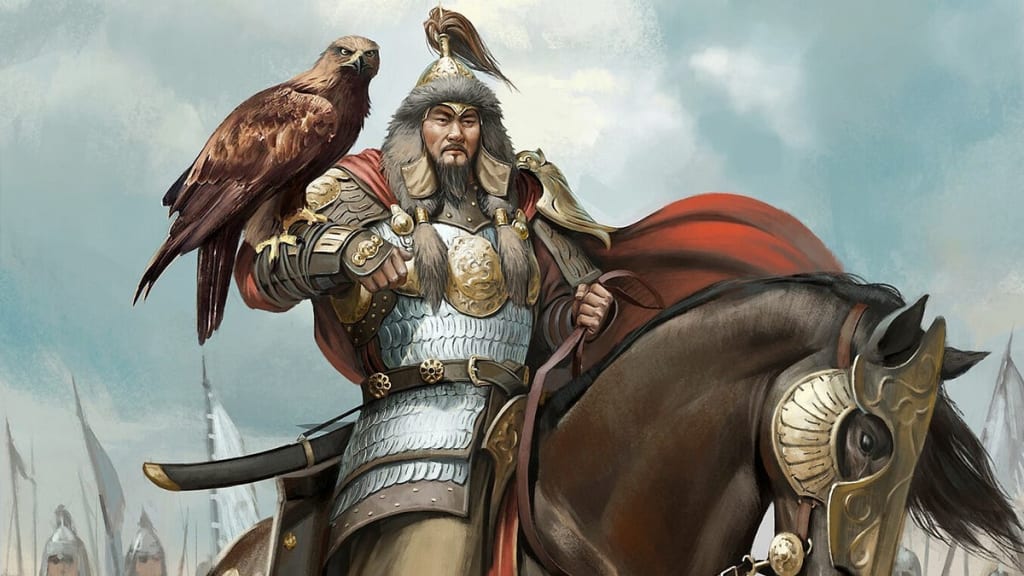The Mongol Empire: Genghis Khan and the Conquest of Asia
Unveiling the Rise, Conquests, and Legacy of the Mongol Empire

In the annals of history, few empires have left as indelible a mark as the Mongol Empire. Led by the formidable Genghis Khan, the Mongols embarked on a relentless campaign of conquest, forging an empire that stretched across Asia, from the Pacific Ocean to the shores of the Mediterranean. This article explores the rise of the Mongol Empire, Genghis Khan's leadership, the empire's vast conquests, and the enduring legacy that continues to shape the region to this day.
1. The Rise of Genghis Khan:
The Mongol Empire had humble beginnings in the rugged steppes of Central Asia. Born as Temujin, Genghis Khan emerged as a visionary leader, uniting disparate Mongol tribes through a combination of military prowess, shrewd diplomacy, and innovative governance. He implemented military reforms, fostered a meritocracy, and instituted a code of laws known as the Yassa, which brought stability and discipline to the Mongol society.
2. Mongol Conquests and Military Strategy:
Under Genghis Khan's leadership, the Mongols unleashed a series of devastating conquests. Employing a highly efficient military machine, they overwhelmed their opponents with superior horsemanship, skilled archery, and tactical brilliance. The Mongols were masters of siege warfare, employing innovative tactics and strategies to subdue fortified cities. Their swift and merciless attacks struck fear into the hearts of their enemies, leading to swift surrenders and capitulations.
3. The Mongol Empire at Its Height:
The Mongol Empire reached its zenith under Genghis Khan's successors, particularly his grandson Kublai Khan. Kublai Khan expanded the empire to its greatest extent, establishing the Yuan Dynasty in China and consolidating Mongol rule over vast territories. The empire encompassed diverse cultures, religions, and ethnicities, fostering a climate of tolerance and cultural exchange.
4. Administration and Governance:
Despite their reputation as fierce warriors, the Mongols implemented an efficient system of governance in their conquered territories. They appointed local administrators and allowed autonomy to regions, as long as they paid tribute and remained loyal to the Mongol Empire. The empire benefited from a vast network of trade routes known as the Silk Road, facilitating the exchange of goods, ideas, and technologies between East and West.
5. Cultural Exchange and Legacy:
The Mongol Empire facilitated unprecedented cultural exchange between East and West. The Mongols assimilated elements of the diverse cultures they encountered, while also leaving their own cultural imprint on the regions they ruled. They supported the arts, patronized scholars and artists, and encouraged the dissemination of knowledge and ideas. The empire's legacy also includes advancements in trade, communications, and governance, which influenced future empires and civilizations.
6. Decline and Fragmentation:
The Mongol Empire began to decline after the death of Kublai Khan. Internal power struggles, rivalries among Mongol factions, and the strains of managing such a vast empire contributed to its fragmentation. Eventually, the empire splintered into separate Khanates, each ruling over a distinct region. While the Mongols continued to exert influence, their unified empire ceased to exist.
7. Enduring Impact:
The Mongol Empire's impact on the conquered lands and subsequent civilizations cannot be overstated. The empire facilitated cultural exchange, spread knowledge, and fostered economic growth. The integration of different cultures under Mongol rule paved the way for future empires, such as the Timurid and Mughal Empires. The Mongol conquests also influenced military tactics, as European powers studied and adopted Mongol strategies.
Conclusion:
The Mongol Empire, under the leadership of Genghis Khan and his successors, stands as a testament to the power of ambition, military prowess, and visionary leadership. Their conquests reshaped the geopolitical landscape of Asia, fostering cultural exchange, economic growth, and technological advancements. The legacy of the Mongol Empire continues to resonate in the regions it once ruled, reminding us of the profound impact that one empire can have on the course of history.
About the Creator
Omer Mir
A curious soul with an insatiable love for the written word, passionately weaving words into captivating narratives across limitless subjects.
Enjoyed the story? Support the Creator.
Subscribe for free to receive all their stories in your feed. You could also pledge your support or give them a one-off tip, letting them know you appreciate their work.






Comments
There are no comments for this story
Be the first to respond and start the conversation.